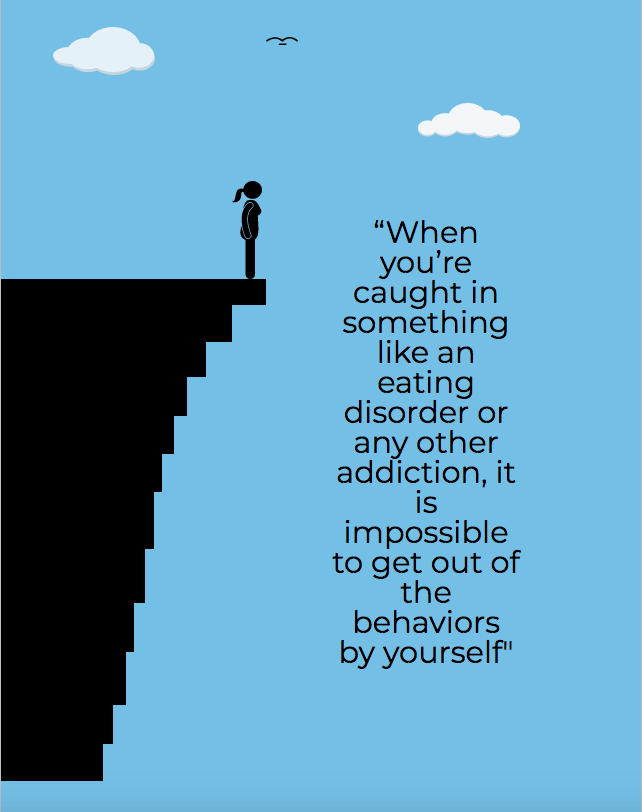The Cliff of Recovery
The struggles of eating disorders and the journey of recovery
Eating disorders are sometimes compared to the feeling people afraid of heights experience when they stand on the edge of a cliff.
Imagine being afraid of heights and having to go stand on the edge of the cliff three times a day. This type of fear is a reality for individuals struggling with eating disorders. My friend, who wishes to stay anonymous, is in recovery from anorexia nervosa and has agreed to share her story with me. Obviously, this is a sensitive topic but an important one that is not talked about openly, especially at Westminster.
My friend, who will go by the name of Rene, found herself sitting in a Westminster health class listening to the teacher talk about eating disorders.
“I remember sitting there and thinking, being underweight and having to gain weight sounds like such a nice problem to have. I was super insecure at the time about my weight so not having to worry about losing weight and instead being underweight seemed great,” said Rene.
Rene’s self-image began deteriorating over the coming weeks as she found herself thinking and worrying more about food and her weight. She began to obsess over assignments in class that involved calorie counting and learning how to avoid certain foods.
“I think that [health] class can be a really helpful and good class to take for most people, but I was already heading down this path, so it encouraged and intensified a lot of negative thoughts,” said Rene.
As the weeks progressed, Rene started restricting her diet and over the summer began to lose weight. Anorexia nervosa is connected to the fear of gaining weight and therefore, results in restricting foods and over-exercising to prevent weight gain. However, weight loss is just one of the many symptoms of the disorder and oftentimes, individuals can struggle without others even noticing any physical changes.
Eventually, Rene started attending therapy for help and was sent to residential treatment where she began her journey of recovery.
“When you’re caught in something like an eating disorder or any other addiction, it is impossible to get out of the behaviors by yourself. I remember feeling completely lost, confused, and always anxious. I knew that I needed to stop, but I felt powerless to do that,” said Rene.
In treatment, Rene met other girls who understood her struggle and were also in recovery. Some were in recovery from anorexia, while others dealt with bulimia, binging, and some struggled with all three. Sadly, the group home she lived in was almost always full of girls aging from 12 to 17.
In America, “at least 30 million people of all ages and genders suffer from an eating disorder,” according to the National Association of Anorexia Nervosa and Associated Disorders. This is an incredible amount of people in America and is mostly due to diet culture, photoshopping, and the intense focus on appearance. Also, most people dealing with eating disorders also struggle with anxiety, depression, OCD, social phobia, or other mental health illnesses.
Rene is still in recovery, but she admits that her journey is anything but perfect: “I have come a really long way with my relationship with food, but there are times when old behaviors pop up, and then I have to deal with the repercussions of my actions.”
In a society so fixated on numbers, “good” and “bad” foods, and new fad diets, eating disorders are inevitable. However, that doesn’t mean nothing can be done to lessen their severity and decrease the number of people affected by these eating disorders.
“I think that mental health in general needs to be talked about more openly. Everyone deals with some sort of mental health issue to a certain degree, so people can relate to a certain degree with your struggles. It can be equally as bad, though, to overemphasis disorders and create a society where nobody can do anything because it might ‘trigger’ someone. We have to find a balance where we acknowledge our issues and feel more comfortable talking about them, but also have grace for others who don’t completely get what you’re going through,” said Rene.
Eating disorders are a reality for all people, and that includes students at Westminster, unfortunately. So, talk to someone if you need help, or be the friend that reaches out when you see someone else struggling.
“One of my therapists told me that eating disorders don’t evolve overnight, and they won’t go away overnight either. You need people to support you, check in on you, and talk to you, and you can be that person for someone else, too,” Rene advised.





